Research
My Research Toolkit
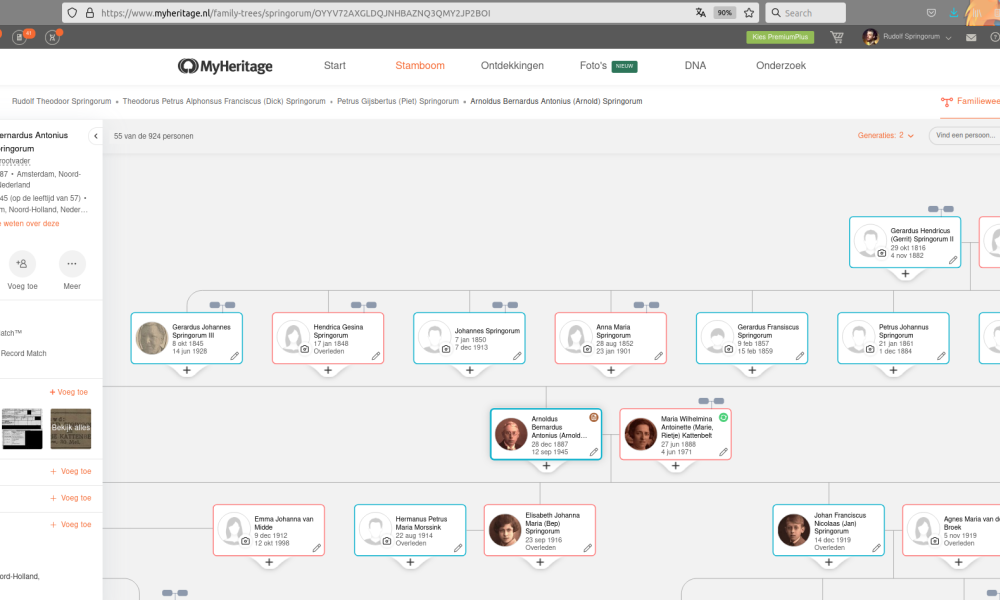
Welcome to My Research Toolkit
Hello! I'm Rudolf Springorum, and this page is your behind‑the‑scenes pass into my genealogy and archival research approach. I’m dedicated to uncovering the Springorum story—tracing our patrilineal roots, mapping our branches, and bringing long‑lost ancestors back into view.
What You’ll Find Here
-
Dutch & Belgian Archives
I rely heavily on OpenArchieven for deep access to civil records—births, marriages, deaths—using wildcards to pick up every variation of our name. -
Amsterdam City Archives
With over 50 km of records and 7 million digitized items, this is a treasure trove for anyone researching Springorums in Amsterdam. -
Newspapers & Books (Delpher)
From 17th‑century journals to modern newspapers, Delpher is invaluable—though its OCR quirks mean I often experiment with spelling variations. -
German Church Records
Archive.NRW, Archion, and Matricula offer access to centuries‑old baptisms, marriages, and burial records from across NRW, Austria, and Slovenia—sometimes requiring patient manual work.
Digital Tools I Use
- MyHeritage – Great for building a shared online family tree, but prone to errors—so I always verify data myself.
- Transkribus – An HTR tool that turns old handwritten records into searchable text—an absolute time‑saver for deciphering 17th‑century entries.
- ChatGPT – A writing assistant especially helpful as a non‑native English speaker, helping me polish emails, transcriptions, and interpretive notes.
- Grav CMS – The content management system powering this site: lightweight, Markdown‑friendly, and custom‑style‑ready.
This page is both a guide and a toolkit—offering the links, tips, and tools that I use daily to dig into the archives, build our family narrative, and preserve history. I hope it inspires and supports your own research journey!
Archives
OpenArchieven
Access to all Dutch archives
OpenArchieven is a Dutch‑Belgian genealogy portal that provides searchable access to millions of archival records—births, marriages, deaths, notarial acts, and more—from archives and historical societies across the Netherlands and Belgium. It offers robust search tools for people and surnames, automatic linking of related documents, downloadable results (e.g. GEDCOM, CSV, PDF), transcription snippets, and a subscription-based model (free trial, then €22/year for full access).
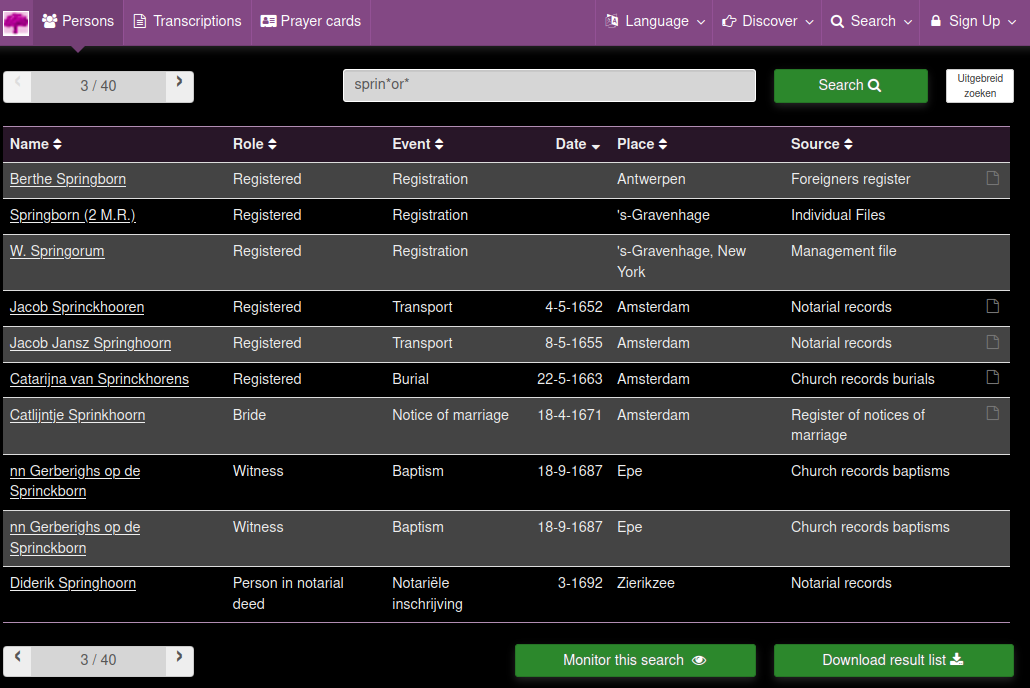 Openarchieven.nl is arguably the best starting point for researching Dutch archives. Search results link directly to the relevant municipal archives. The support of wildcards (Like: "sprin*or*" in the screen above) helps to find results with various spelling of the name Springorum.
Openarchieven.nl is arguably the best starting point for researching Dutch archives. Search results link directly to the relevant municipal archives. The support of wildcards (Like: "sprin*or*" in the screen above) helps to find results with various spelling of the name Springorum.
Link: https://www.openarchieven.nl/
Stadsarchief Amsterdam
City archive of Amsterdam
The Amsterdam City Archives (Stadsarchief Amsterdam) is the municipal archive of Amsterdam, based in the historic De Bazel building. It preserves around 50 km of records—including municipal, church, business, and university collections—spanning nearly 750 years of the city's history. The archive offers an online image bank (over 260,000 items) and searchable indexes and inventories, with more than seven million digitized records freely available on its website. On-site visitors can access original documents, request scans on demand, attend exhibitions, and use research facilities in the Vijzelstraat location.
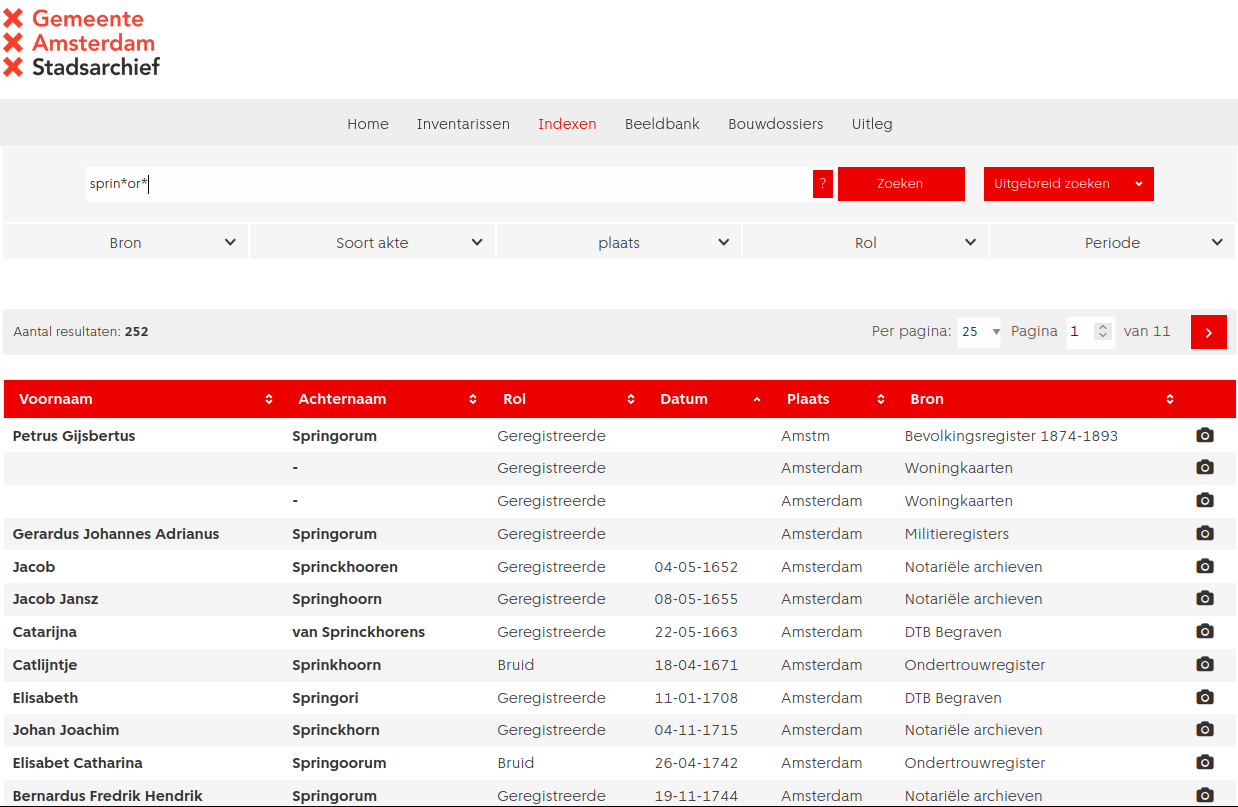 I'm very fortunate to have both a rare last name and ancestors who lived in a major Dutch city with well-organized records, including older church books. Whenever I search for the name Springorum, the results almost always lead to people from the same family tree in Amsterdam. Also here are wildcards supported in the search.
I'm very fortunate to have both a rare last name and ancestors who lived in a major Dutch city with well-organized records, including older church books. Whenever I search for the name Springorum, the results almost always lead to people from the same family tree in Amsterdam. Also here are wildcards supported in the search.
Link: https://archief.amsterdam/
Delpher
Dutch newspaper and books archive
Delpher is a free Dutch online archive that gives access to millions of digitized newspapers, books, journals, and radio bulletins from the 17th century to today. It’s an invaluable resource for researchers, genealogists, and anyone interested in Dutch history, offering powerful search tools to explore original texts and historical context.
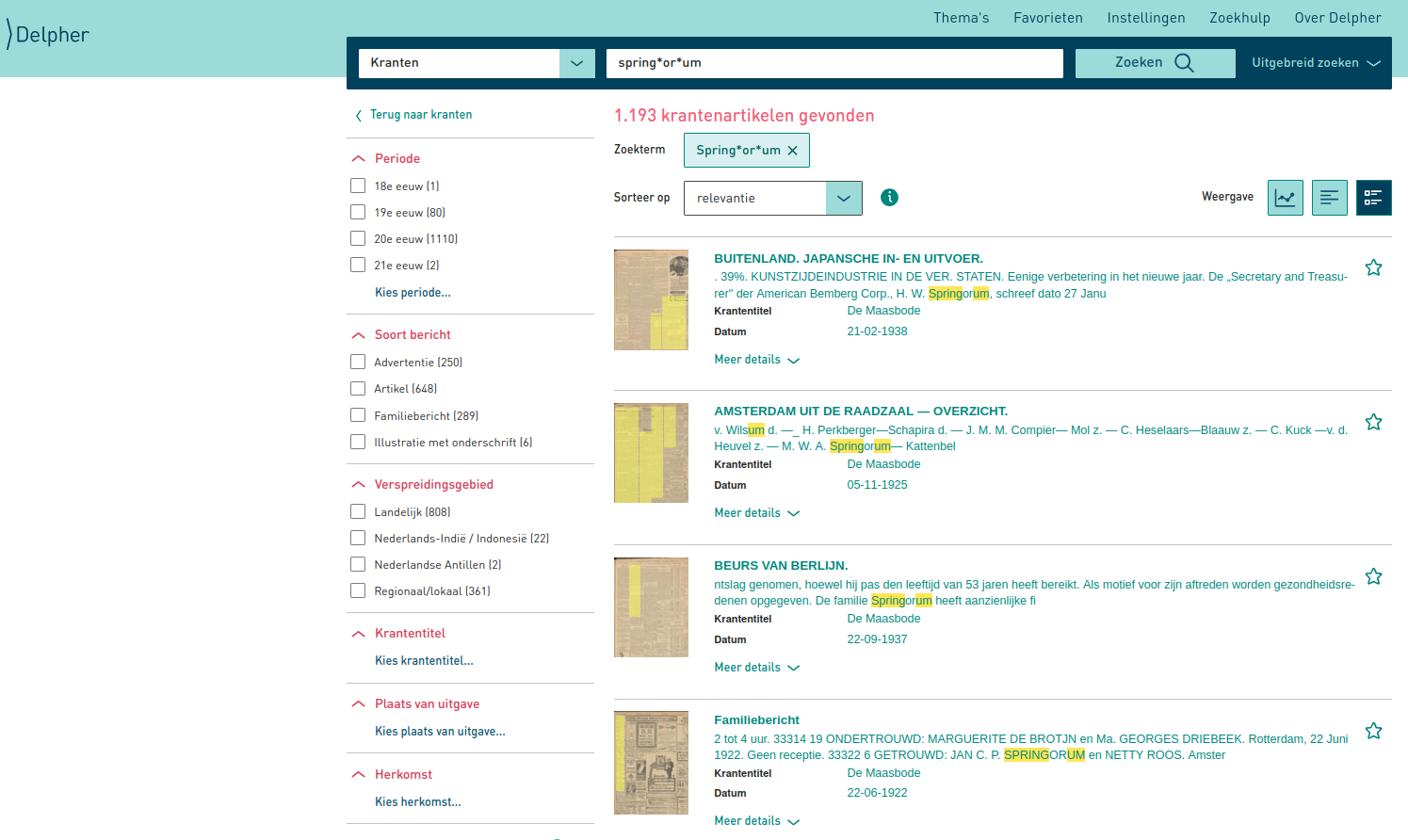 Newspapers and books often hold valuable information that doesn’t show up in a regular Google search. This dedicated site lets you search for specific words across hundreds of historical documents. However, the OCR used on this site isn’t always accurate, so I often try variations in spelling to improve the chances of finding what I'm looking for.
Newspapers and books often hold valuable information that doesn’t show up in a regular Google search. This dedicated site lets you search for specific words across hundreds of historical documents. However, the OCR used on this site isn’t always accurate, so I often try variations in spelling to improve the chances of finding what I'm looking for.
Link: https://www.delpher.nl/
Wie was wie
Dutch starting point for genealogy research
WieWasWie.nl is a central Dutch genealogy platform offering access to millions of historical records, including births, marriages, deaths, and passenger lists. It connects users to original documents from various Dutch archives and is an essential resource for anyone researching Dutch ancestry. (Paid version allows search using wildcards and for two people simultaneously, €50,-/year)
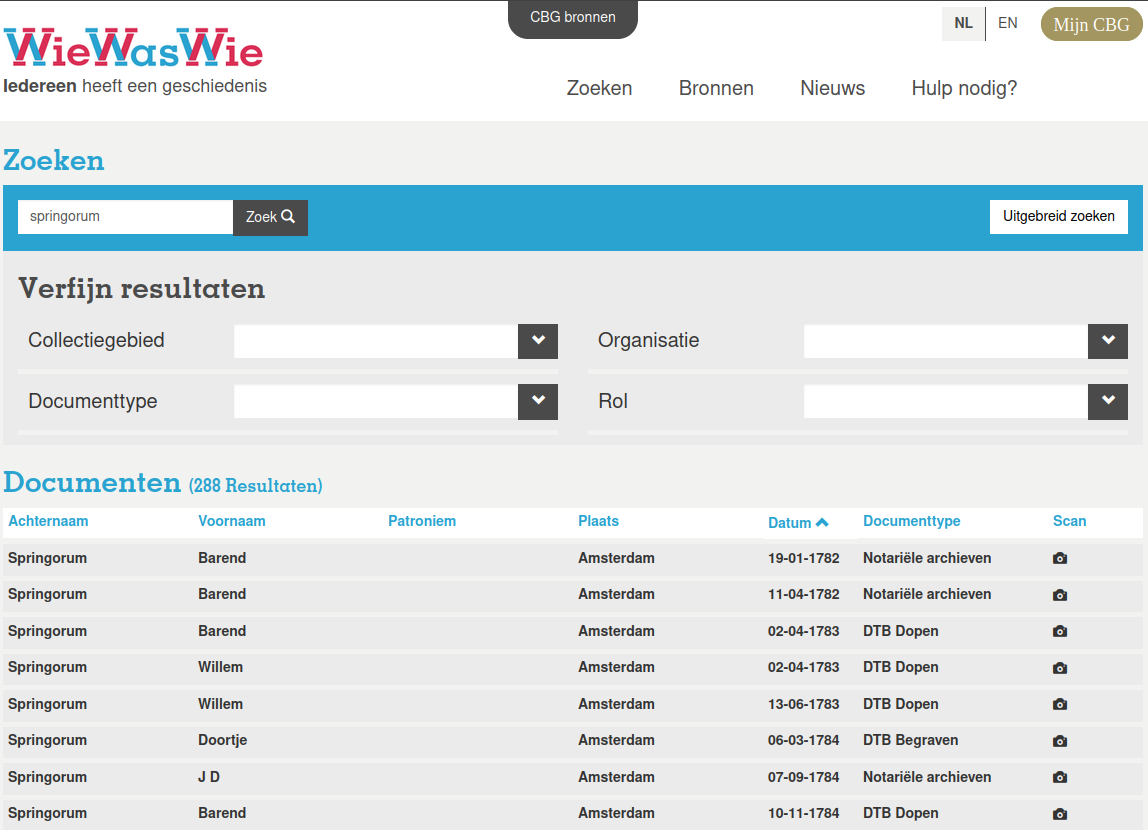 Unfortunately search using wildcards is only supported with paid subscription.
Unfortunately search using wildcards is only supported with paid subscription.
Link: https://www.wiewaswie.nl/
Archive in Nordrhein Westfalen
German archive including regions of Dortmund/Essen
Archive.NRW is the central online portal for archives in North Rhine-Westphalia, offering free access to millions of archival records and digitized documents from over 480 state, municipal, church, business, and university archives. Users can search by keyword or map, browse finding aids, view digital scans, and request materials for in-person viewing, making it a key resource for historical and genealogical research in the region.
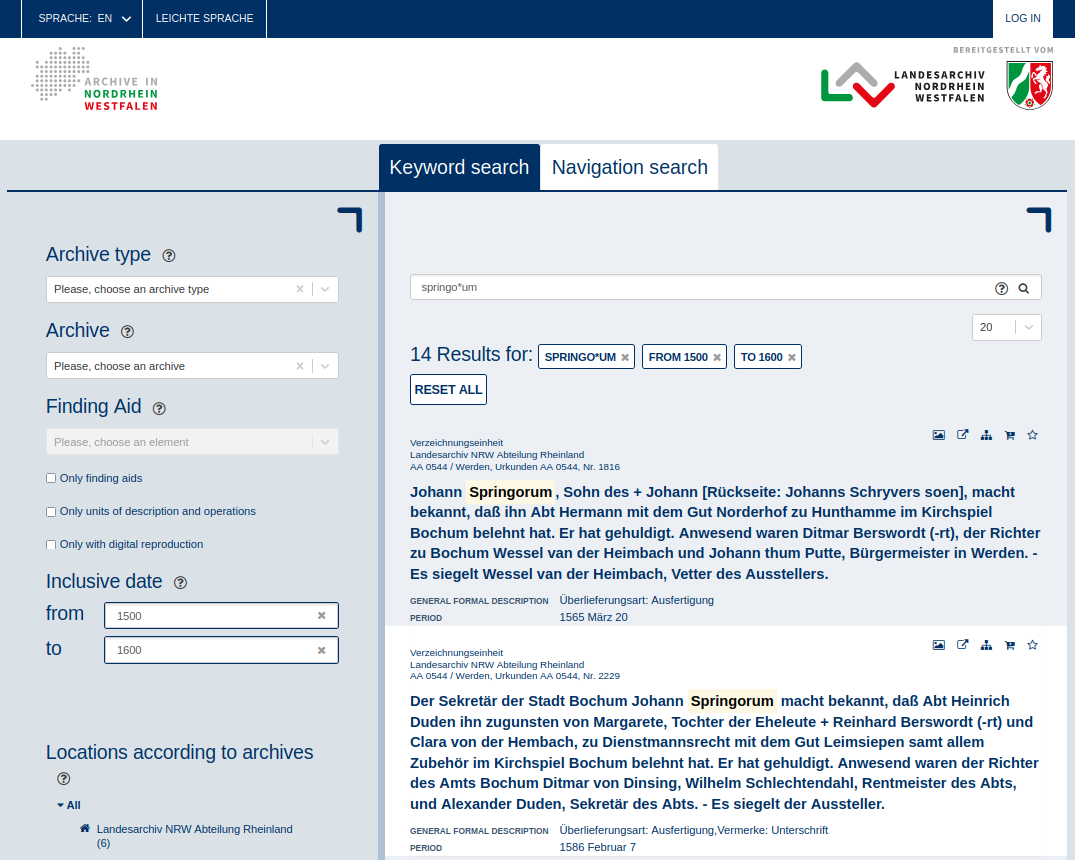 Here I found several 16th documents found holding the name Springorum.
Here I found several 16th documents found holding the name Springorum.
Link: https://www.archive.nrw.de/archivsuche
Archion
German commercial archive church registrations
Archion is a paid web portal offering online access to over 175,000 digitised German church registers—baptisms, marriages, deaths—from some 25 archives, ideal for genealogical and prosopographical research. Users can search by location or archive, view and download records via short‑, medium‑ or long‑term subscription passes, and explore old‑German script materials with optional paleography aids. (Paid acces only: €19,90/month, €52,20/3-month or €178,80/year)
Link: https://www.archion.de/de/
Matricula
Free German archive church registrations
Matricula Online is a free digital archive of Catholic church records—primarily baptisms, marriages, and deaths—from Austria, Germany, Slovenia, and several other European countries, offering scanned parish registers dating back to the 16th century. Users can browse by diocese, parish, location, and timeframe, and can view or download original register images. However, these records are not indexed, so name searches aren’t possible. Instead, I’ve spent countless evenings reading through the books, manually searching for traces of my family.
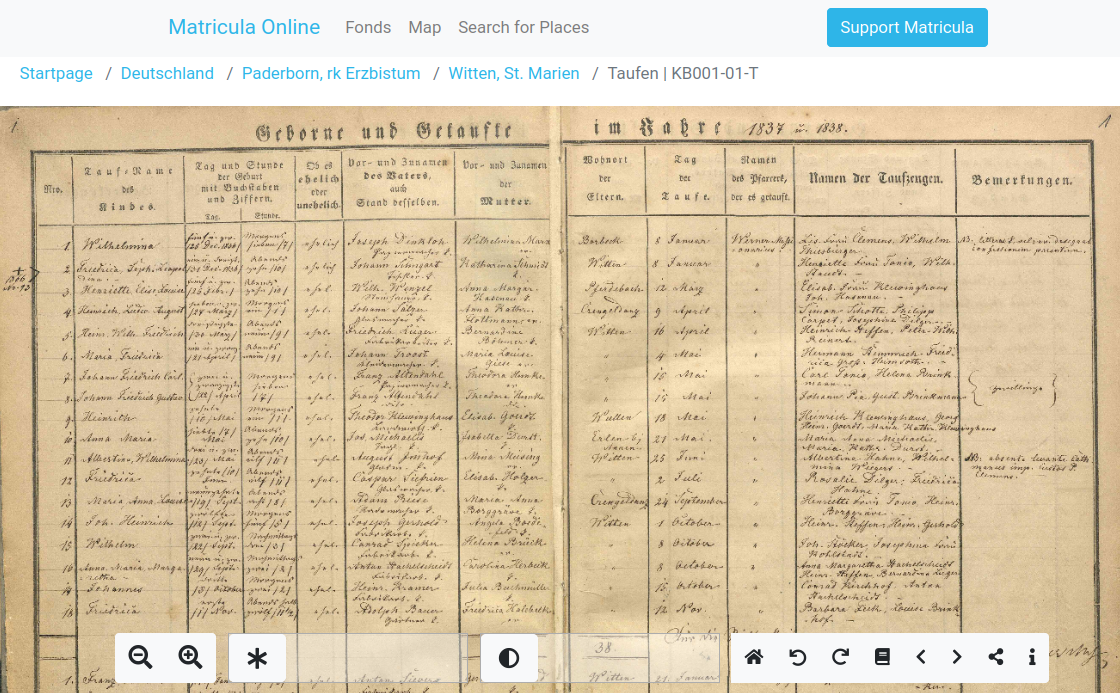 This site has given me the most useful and trustworthy church records I’ve found. It helped uncover full family trees from a small community around Henrichenburg, Recklinghausen, and Dortmund. Unfortunately this site has no records of churches in the area of Düsseldorf - Köln - Wuppertal.
This site has given me the most useful and trustworthy church records I’ve found. It helped uncover full family trees from a small community around Henrichenburg, Recklinghausen, and Dortmund. Unfortunately this site has no records of churches in the area of Düsseldorf - Köln - Wuppertal.
Link: https://data.matricula-online.eu/en/
Wikipedia
Generic platform
Wikipedia is a free, multilingual online encyclopedia written and maintained by a global community of volunteers. Anyone can create or edit articles, and all content is collaboratively curated under a neutral point of view. Operated by the non-profit Wikimedia Foundation, Wikipedia provides reliable, citation-based knowledge on millions of topics, and is widely used for general research, education, and reference across the world.
Link: https://en.wikipedia.org/wiki/Main_Page
Tools
MyHeritage
Commercial web-based online genealogy site
The MyHeritage “Springorum” family site is a private, subscription-based online family tree hosted on MyHeritage, where the family’s genealogical data—names, dates, relationships, photos, and historical records—is compiled and shared among invited members. It integrates tree-building tools, access to billions of global historical records and DNA match features (with a free trial then premium subscription). (Free limited to 250 persons/500MB, no smart matches, €108.96/year for 2500 persons/1GB, €182.04/year for unlimited number of persons/30GB)
The advantage of an online genealogy platform is that information is instantly shared and compared with hundreds of other family trees, which can greatly speed up the search for your ancestors—branches often appear automatically. However, caution is needed. I’ve come across several cases of incorrect connections between people that were then blindly copied into other trees. So while I do use these tools, I always verify the information myself—especially the parts I care most about, like the direct male line starting with Reinhard Springorum, the earliest confirmed ancestor to carry the Springorum name.
Link: https://www.myheritage.nl/family-trees/springorum/
TransKribus
AI supported handwriting recognition
Transkribus is an AI-powered platform for transcribing historical documents, especially handwritten or early-printed texts. It uses Handwritten Text Recognition (HTR) to convert scanned pages into editable, searchable text. You can upload images, perform layout analysis, and apply pre-trained or custom models to automate transcription. Transkribus offers both free and paid plans depending on usage. (Free using standard AI text recognition, €99,-/year using super models and advanced AI tools.)
Reading old documents can be incredibly challenging. When I first started my research, I would spend entire evenings trying to transcribe a single notarial record. With Transkribus, that process now takes just a few minutes. For the most difficult texts—like 17th-century birth records from St. Nicolai Church in Dortmund—I even used the paid version that uses the most advanced trained models.
Link: https://app.transkribus.org/
ChatGPT
Generic AI assistent
ChatGPT is a tool created by OpenAI that helps people write better by using artificial intelligence. You can ask it to help you write emails, stories, summaries, or code, and it gives suggestions or full drafts in seconds. It's easy to use—just type your question or request—and it's popular with students, writers, and anyone who needs help with words.
You may have noticed it already, but as a non-native English speaker, I really appreciate how ChatGPT suggests ways to restructure texts.
Link: https://chatgpt.com/
Grav
Free open-source content management system
Grav is a free, open-source, file-based CMS that helps you write and publish website content quickly and easily using Markdown. There's no database—just extract the zip and you're ready to go. It features a clean admin panel, built-in versioning, one-click installs for themes and plugins, and lightning-fast performance thanks to smart caching and simple file architecture. Whether you're crafting a blog post, landing page, or documentation, Grav lets you focus on writing—handling formatting, organization, and publishing with minimal overhead.
I use Grav as the content management system for this Springorum website. It offers ready-to-use themes and allows me to add custom CSS whenever needed.
Link: https://getgrav.org/
Genealogy Websites
Frank Heidermanns
Heidermanns.net is a personal genealogy website by Frank Heidermanns that hosts extensive family trees and individual profiles for the Heidermanns and related families.
Covering about 50 Springorums, starting at Johannes Springorum (1625-1694)
Link: https://www.heidermanns.net/gen-form.php?MD=pers&VF=L&FN=Springorum
de Paula Lopes
de-Paula-Lopes.nl is a personal genealogy site by Marnix Alexander de Paula Lopes, tracing family roots across Dutch, Portuguese, and colonial histories. It features detailed pedigree charts, archival documents, and original source images, offering a rich blend of research and storytelling.
Mainly focused on Captain Jan Olhoff, a VOC sailor and privateer commander of the ship De Spion, on which he sailed alongside Barend Springorum.
LinkL https://de-paula-lopes.nl/
Miscellaneous Websites
Heimatkunde Schwelm
Heimatkunde‑Schwelm.de is a community‑driven, free online archive focused on the local history of Schwelm and its surroundings. It offers downloadable documents—like 18th- and 19th-century residents’ lists, address books, and historic maps—along with images from Heimatfest celebrations, industrial sites, and everyday life. Run in close cooperation with citizens and the city archive (but not the local history association itself), it’s a rich resource for anyone researching regional heritage or genealogy in this Westphalian town.
One of the most fascinating finds was an old stamtafel (family chart) created long ago. All pages have been scanned in high resolution and contain a wealth of detail about the Springorum family tree.
Link: https://heimatkunde-schwelm.de/ (Stamtafel) (Starting at Reinhard Springorum (1593-1666))
Link: https://heimatkunde-schwelm.de/ (Stambaum Wagenknecht) (Starting with Johann Bernhard Springorum II (1726-1790))
Link: https://heimatkunde-schwelm.de/ (Schwelmer familien) (Various Springorums, Friedrich Wilhelm Springorum (1782 - 1838))
Wupper Digitale Fotografie
The K.D. Wupper website is a personal, richly illustrated collection of historical content curated by photographer K.D. Wupper. It features high-quality photos and insights on local history, with a strong focus on churches, monuments, and regional heritage. While not an official archive, the site serves as a well-organized cultural record, offering detailed visuals and background information on various locations and artworks.
To my surprise, this site holds many high quality photographs of the many ledger stones that can be found near the Dorfkirche in Kirchende and outside the Stiftskirche in Herdecke. These stones mark the graves of prominent members of the Springorum family,
Link: https://www.kdwupper.de/herdecke_ev_stiftskirche_st_marien.html